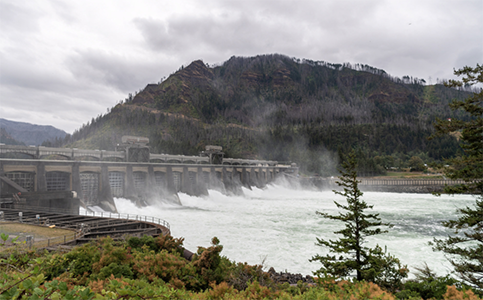The $139 million in yearly water releases partly mimic how the river ran prior to dams, helping young salmon making it to the ocean
||| BY HENRY BRANNAN, COLUMBIAN MURROW NEWS FELLOW |||
At 12 this morning [April 10], the U.S. Army Corps of Engineers opened Bonneville Dam’s spillway gates, marking the beginning of seasonal water releases known as “spill.”
By 11:59 tonight, nearly 13 billion gallons of water will have barreled over the top of the last man-made obstacle young salmon face on their journey from their home streams across the West and into the Pacific Ocean.
Spill, which is now happening at each federal dam along the Columbia-Snake river system that has fish passage, allows out-migrating salmon to dodge the dams’ deadly turbines, increasing their survival rate and eventual returns.
But this year, in addition to battling hundreds of miles of near-still water, predators and a warming ocean, the roughly 6.6 million roughly pinky-finger-sized young fish also face a Trump administration that has attacked the notion of using the West’s rivers for anything but pure and immediate commercial gain.
Why spill?
“Before the dams were in place, there was a huge flood every spring and early summer of cold water that pushed tens of millions of salmon and steelhead juveniles out to the ocean,” said Joseph Bogaard, executive director of Save Our Wild Salmon.
Dams mostly drowned that once-wild Columbia’s seasonal fluctuations, transforming the river into a slack-water machine that generates hundreds of millions of dollars in hydropower each year and allows ships carrying billions of dollars in goods to travel from the Pacific as far inland as Idaho.
Legally mandated seasonal water releases are a choreographed effort to mimic the natural flows while primarily protecting the river’s dominant interests: flood risk mitigation, hydropower production and commercial shipping.
To environmental advocates, spill is both a compromise and a powerful, research-backed stop-gap tool to hold off looming regional salmon extinction until long-term solutions like Lower Snake River dam removal prevail.
Even with spill, however, journeys from the far reaches of the Snake River out to the Pacific that used to take young salmon about two weeks now take two months, said Jeremy FiveCrows who runs communications for the Columbia River Inter-Tribal Fish Commission.
Water managers at Bonneville say spill is important. But they argue it carries risks, and that bypass options the dam offers out-migrating fish are often actually safer.
To power managers, spill is, more than anything else, a “cost” because that water could have been put to work generating power. Over the past 25 years, spilled Columbia River water could have generated an average of $139 million each year, said Doug Johnson, spokesman for Bonneville Power Administration, which markets the power produced by federal Columbia-Snake river dams.
Johnson also said BPA expects replacing that theoretical power will cost about $240 million annually in coming years.
Environmentalists, Native nations and recreational fishing groups point out the river has value outside of the power it produces and isn’t just a hydropower plant that has fish, for now.
A downstream battle
Despite those disagreements, federal river managers, regional Native nations, environmental groups, as well as Washington and Oregon, reached a Biden administration-brokered salmon restoration agreement in 2023 that, in part, set a new spill regime across the basin.
Under that agreement, Bonneville currently spills 150,000 cubic feet of water per second from April 10 to June 15, said Jeanette Flemmer, the dam’s chief of fisheries.
That amount decreases as the value of power goes up later in the year, arriving at 95,000 cfs from June 16 to the end of July, and 50,000 cfs for August.
**If you are reading theOrcasonian for free, thank your fellow islanders. If you would like to support theOrcasonian CLICK HERE to set your modestly-priced, voluntary subscription. Otherwise, no worries; we’re happy to share with you.**








